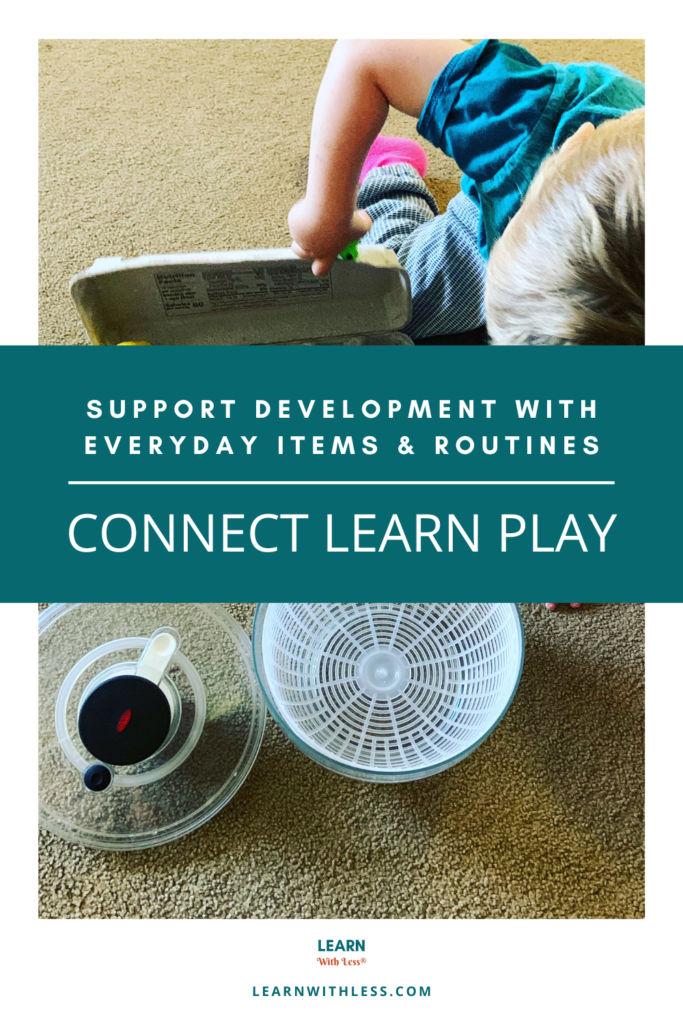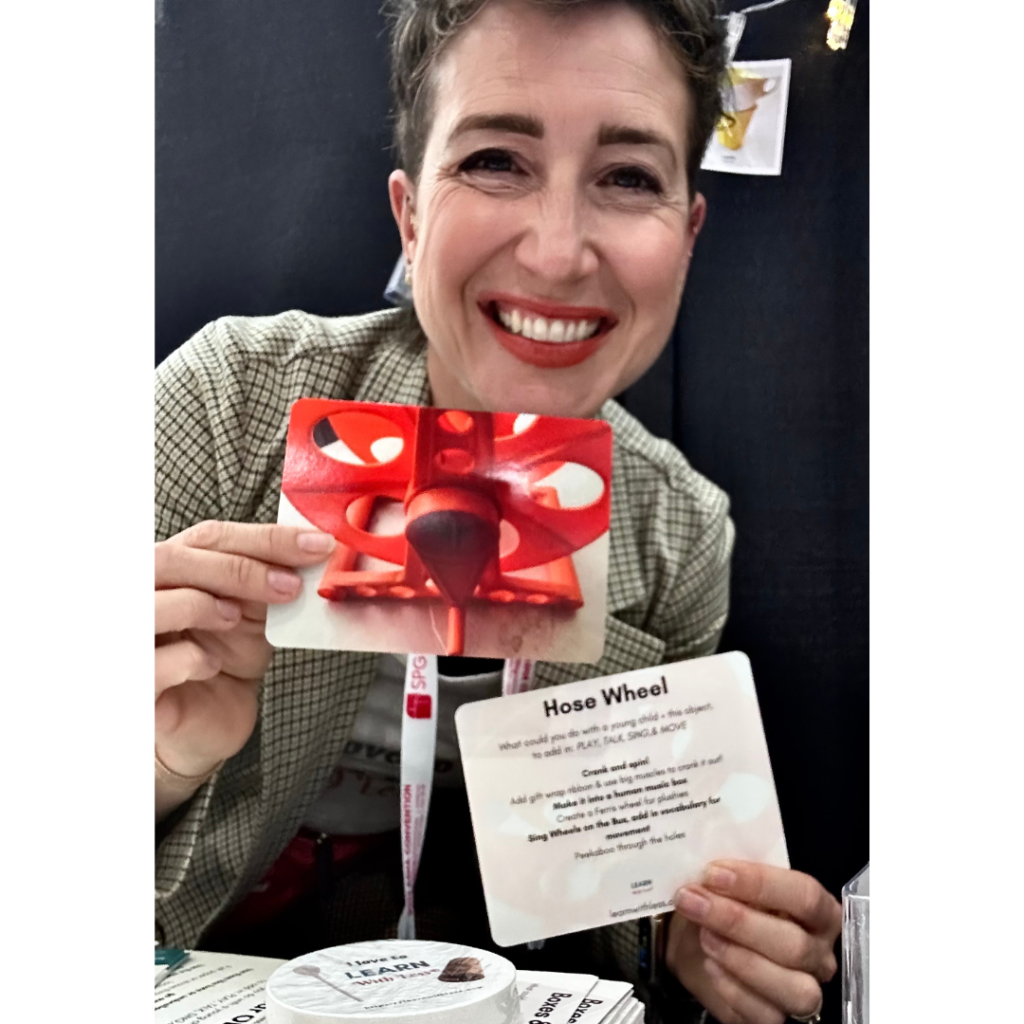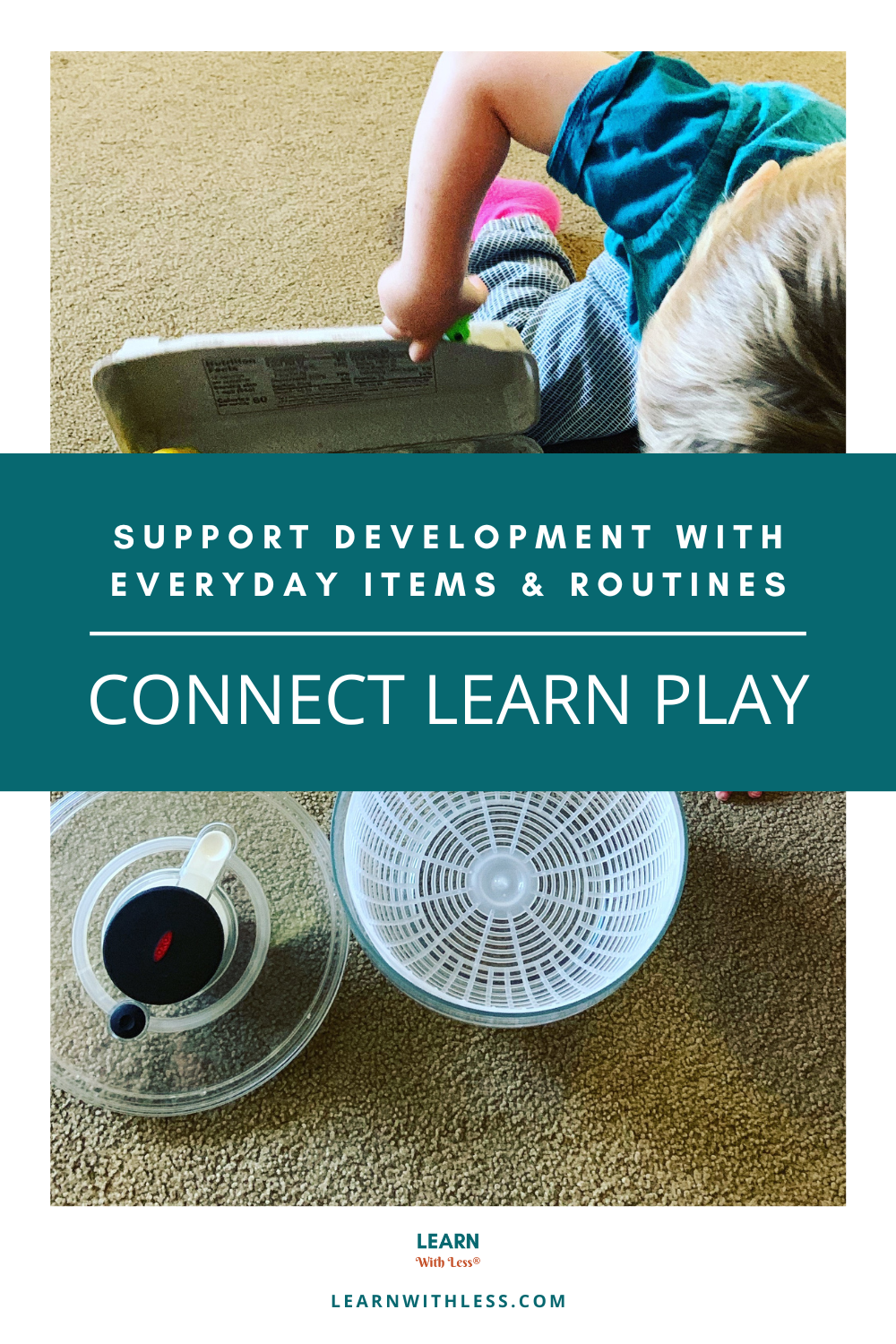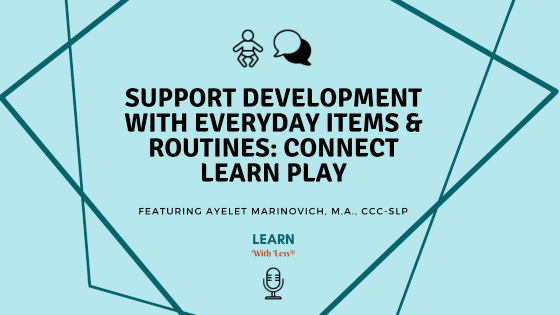You’ll always know how to support a young child’s development with a laundry basket, a cardboard box, or a dishtowel!

On this episode of the Learn With Less® podcast, Ayelet discusses how a simple shift in our understanding of what we can view as “educational materials” or “toys” can help us see how little we actually need to buy… And also how much power there is in opening up our own eyes to the wonder of play, as seen through a young child.
Are you a new parent or caregiver wondering what you really need to support and connect with your baby or toddler? Or are you a professional who serves new families as a developmental therapist, early childhood educator, or other professional in the perinatal space? This episode and our related resource, Connect Learn Play, is for you!
Helpful Resources Related to This Episode
Learn With Less® Facilitator Training & Certification Program
Connect With Me
Ayelet: Facebook / Instagram / Pinterest
Text Transcript of The Podcast Episode
Hi there. I’m Ayelet Marinovich, and you’re listening to Learn With Less®. Today, I wanted to share a little bit about a very exciting new resource that we have just released here at Learn With Less®, in collaboration with my friend and colleague, Miranda Zoumbaris at The Emerging Parent. Miranda and I attended the American Speech Language and Hearing Association conference back in November 2023, and at that convention hall, we had a exhibit booth for Learn With Less®.
One of the fun giveaways that I had created was a series of postcards. On the front was an image of an everyday object, like a funnel or a laundry basket or a box. On the back there were a series of ideas for how you could use that everyday, simple object (a commonly found household item) to support connection and development through the use of play, language, music or movement. These are the four pillars of Learn With Less®: play, talk, sing and move.
Now, I had created these as a giveaway, and they were sort of a testing ground for the kinds of fun things that might be useful for both professionals serving young families as well as new parents and caregivers themselves. What happened was pretty hilarious. Everyone was getting them as giveaways, and they were asking where they could buy the product. So Miranda and I got to work creating this new, exciting resource for all of you, and we call it Connect Learn Play.
What does Connect Learn Play do? Basically, the promise is that you’ll always know how to support a young child’s development with a laundry basket, a cardboard box or a dish towel. Connect Learn Play is a resource for parents and caregivers of young children and for practitioners working with zero to five year olds. They are digital, printable, infant, toddler and preschool aged ideas to provide simple, enriching ways to support early development through play, language, music and movement, using everyday items, helping you to Learn With Less®.
What Does It Mean to Connect Learn Play?
I want to give you a little bit more information about what Connect Learn Play is, and why it is a useful resource for you. So essentially, it’s your invitation to stress less, to need less and spend less of your time and money so that you can feel more confident, be more responsive, and create more connection.
So, picture this: you’re sitting on the floor with your tiny human. You’re trying to figure out what to do to maximize the 20 minutes between the time you’ve gotten home and the time you’ve got to start getting ready for the next meal. You take out your devil device and start scrolling through Tiktok or Pinterest or IG, or whatever the latest idea rabbit hole where you’re currently following the latest parenting or early childhood influencer. Everything you find requires materials that are not within arm’s reach. And everything requires time you don’t have. Everything requires pre-planned brain space that you don’t have. And in the meantime, your child has found the curtain above them.
What do you do next?
A, pull your child away from the curtain again and again.
B, distract them with one of the five toys you got suckered into buying from this year’s best toys to buy for kids under five.
C, join your child at the curtain after recalling the idea about using long fabrics on the Learn with Less® Connect Learn Play prompt yesterday.
You can play peek a boo. Or you can talk about the color or texture of the curtain, or what you see outside the window. You could sing a song about hiding and seeking. And you could follow your little one around as they move behind the curtain. Listen, you get to decide!
Connect Learn Play cards are a classic resource from Learn With Less®. They’re designed to prompt you to start thinking about ways to connect the dots between what a child is showing interest in, between the relationship between caregiver and child. And to connect the dots between the literal neurons in a young child’s brain that enable them to grow, learn and thrive without being prescriptive, overly structured or requiring of any specific toy. Connect Learn Play helps parents and caregivers make the connection between a child’s interests and strategies used to support development, whether that child is experiencing a delay, is right on target or is ready for more.
If you are a parent, a caregiver or a provider of developmental services, then Connect Learn Play is for you! As with all the resources we create here at Learn With Less®, we use the four-pillar framework of the Learn With Less® curriculum (as I mentioned, play, talk, sing and move) to address four major areas of infant and toddler development: cognitive, communicative, motor and social and emotional development.
Toys and more materials take up, extra space, cost more and sometimes even prevent us from following a young child’s lead and responding to what they’re interested in at the moment. So, let’s get real. As a mother, a pediatric speech language therapist, and as a coach for practitioners using the Learn With Less® developmental curriculum, I am certainly not anti-toy. I say, do what works for you. But the idea that you need to buy anything in particular to support a tiny human is not only flawed, but also deeply inequitable.
How To Support Early Development With Everyday Routines and Everyday Items
Supporting development and connection for young children can be simpler than we think. Families need to know how to make use of the natural routines and everyday interactions in front of them. The idea that there’s an inherent developmental value in an object classified as an educational toy is, quite frankly, a delusion. The truth is, you already have the resources to give young children the right stimulation, play, and interaction to thrive – whether or not your toy closet is bursting at the seams. The items in our homes that we already have often hidden in plain view are powerful learning tools that can support all areas of development.
So just imagine, providers and practitioners: instead of spending your precious time pre-planning sessions, hauling that big old therapy bag around, wondering how to do bagless therapy routines based intervention and how to center parent education in your work with young families. You feel confident responding to the parent or caregiver and the child in the moment. You feel rooted in the routine you step into using what the family already has and relying on your own set of skills, knowledge and observations instead of a particular toy. And you feel relieved to have a quick reference guide to use an object the family already has on hand in either printed or digital format so families can generalize and carry over what you practiced in the many, many days and hours while you’re not there.
Now for families, imagine this instead of the constant looming guilt that you’re not doing enough or that you don’t have that special toy or specific material in order to support your kids, brain, language, muscles, emotional needs, I’m looking at those very expensive toy subscription boxes in your social media feed. Instead of all those feelings, you have ideas for play and interaction using what materials, time and energy you already have. You have confidence. You’re doing enough for your young child’s physical and mental development each day. And you have more valuable interactions using the tools at your fingertips to play and engage in enriching activities that support the connection between you. Finally, you also have access to ideas on the go wherever you are with a digital download.
What exactly do I get with Connect Learn Play? So what this is, is access to over 100 ideas for play with 25 everyday items. It is a simple digital download. You’ll be provided with both postcard-sized and full page handouts, in case you want to print a physical copy for easy use or easy sharing with families. For families, you can easily save to a folder on your phone, for instance, print it out and place one on your fridge. And for providers and practitioners, you could text or email an idea to a family with whom you work.
Connect Learn Play can be used during sessions as handouts or cards. They can be provided as supplemental material after. You’ll receive a link to a digital download with all 25 cards in English. Currently, we’re still working on Spanish and Arabic. As a parent or caregiver, or as a provider, you can save these to a folder on your device or print them out for quick reference. Just as you’d refer to a cookbook for a recipe, you could check out what you might do with the ingredients you have on hand. Once you’re using these ingredients regularly, you’ll start to see the power of everyday items. Connect Learn Play can go alongside materials you might use as a clinician, for instance, mental health or developmental therapist, as an early childhood educator, home visitor and or a licensed Learn With Less® class facilitator.
See Play Through A Child’s Eyes

I want to share with you one thing that a current Learn With Less® facilitator, parent of multiple young children who have attended Learn With Less® classes themselves, with me as a facilitator, and who are now in preschool and beyond… I want to share with you what Rachel Kammeyer has to say about the power of Connect Learn Play.
“The most powerful thing is that, like, this veil gets lifted of our adult perspective of the use of an object. And then once you unsee one thing, like a garden hose, you start to unsee it everywhere. You’re open to how a child explores it, versus our expectation of how we use it. Yeah, it’s amazing!
So the preschool I go to is very Learn With Less® in the sense that we use a lot of everyday objects for our activities, and one little girl was touring yesterday. There are these little sticks that look like golf tees, and we have 12 or 15 little things to put them in. And this was, like, this little girl’s jam. She was just putting in and taking out and lining them up. And it was fine motor. It was cognition. It was so beautiful. And the mom was like, How do I buy these? And I’m like, “Oh, do you have hot rollers at home? You can do the same thing. She can put them up and put them right down on this.” And she’s like, I do, and I haven’t used them in forever! She’s like, I never would have thought of that. I’m like, I have been trained in the art!”
I love that from speech-language therapist and Learn With Less® facilitator. Rachel Kammeyer, Thanks, Rachel. So again, who this is for: Connect Learn Play is for families with or expecting infants, toddlers and preschoolers. It’s for individual providers serving families in a home based, clinic based, school based and/or medical setting, and it’s for organizations serving families.
So no more scrolling Pinterest trying to find the perfect activity to set up for your child. No more digging through your therapy bag to find the perfect toy to invite playfulness into a session. Again, there is a simpler, more equitable way to support tiny humans without needing the fancy toy subscription. Connect Learn Play is the perfect, simple resource that allows you to offer a perfect blend of child led and structured play for tiny humans to thrive.
Here’s the thing: when you learn to recognize the tools you already have to boost your child’s development, you are able to maximize the time you have with a young child. You’re empowered to get it right, and you’re able to unlock the power of everyday routines and everyday objects to figure out how to play with your tiny human go ahead and grab Connect Learn Play. Over at learnwithless.com/connectlearnplay. We cannot wait to hear how you’re using Connect Learn Play, and we look forward to hear what you think! Wishing you more great moments with what counts.

